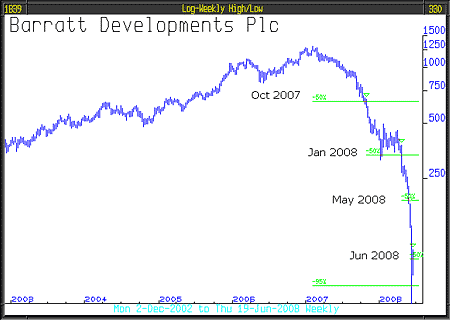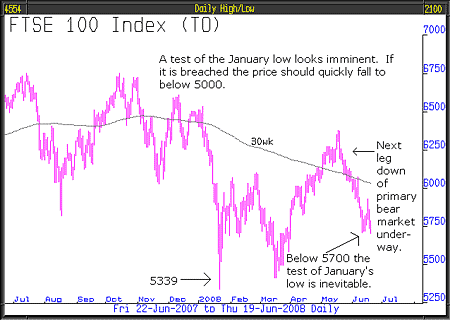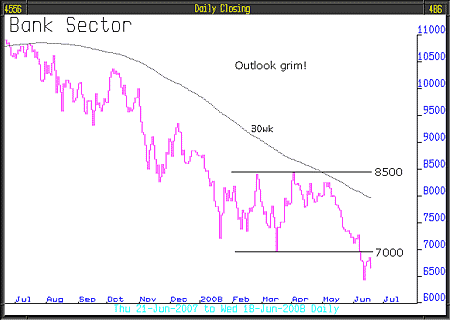Get the latest financial news, insights and expert analysis from our award-winning MoneyWeek team, to help you understand what really matters when it comes to your finances.
You are now subscribed
Your newsletter sign-up was successful
Want to add more newsletters?

Twice daily
MoneyWeek
Get the latest financial news, insights and expert analysis from our award-winning MoneyWeek team, to help you understand what really matters when it comes to your finances.

Four times a week
Look After My Bills
Sign up to our free money-saving newsletter, filled with the latest news and expert advice to help you find the best tips and deals for managing your bills. Start saving today!
Readers will know that we regularly use the phrase, the tide is going out' as a simile for the credit contraction. For asset markets ever to recover, which they eventually will, that process of the tide going out has to end. Premature talk of a market bottom, as occurred in March this year, has no merit or relevance to the utter reality that the tide has nowhere near finished going out.
Imagine arriving at Southend for the first time ever and standing on the promenade. Seeing where the sea is you wonder if the tide is coming in or going out. You ask a local and he tells you that it is still going out, adding that when it has fully ebbed, you won't believe how far out it goes. That is the analogy that you must carry in your mind's eye and all extraneous news should be examined through that prism of knowledge.
There is an old investment saying. Never try to catch a falling knife'. There have been some good examples of this of late. One of the best is Barratt Developments, the house builder, whose share price has, since last year, collapsed by over 95%. Remember this, no matter how far the price has fallen, it can always fall another 50%. We have plotted on the chart a series of 50% falls, starting from the all-time high set in February 2007 at over 1310. By October 2007 it had fallen 50%. An optimist might have bought it then but by January 2008 it had fallen 50%. If an optimist had then bought it, by the 26th May it had lost another 50% and if he had bought it there by June this year he would have lost another 50% and it still has not definitely bottomed out.
MoneyWeek
Subscribe to MoneyWeek today and get your first six magazine issues absolutely FREE

Sign up to Money Morning
Don't miss the latest investment and personal finances news, market analysis, plus money-saving tips with our free twice-daily newsletter
Don't miss the latest investment and personal finances news, market analysis, plus money-saving tips with our free twice-daily newsletter

One of the reasons house builders' share prices have come under such huge pressure is the collapse in the value of their land banks. One of the simple investment truths is that when the house market is in ascendancy, the gains reside mostly in the land and when house prices are under pressure, the losses also reside mostly in the land. Land is, in effect, a geared play on property.
Consider that you have two identical plots each worth £100,000. A house is built on one plot at a cost of £100,000 and when completed is sold for £250,000. The cost of building that house was £100,000 so in effect the plot could be deemed to have increased in value by 50% to £150,000. Now imagine that time has moved on and the house market is in sharp decline. The house is now worth 40% less, £150,000. It still costs £100,000 to build the house; therefore the value of the land has fallen to £50,000, probably less, a third of its previous value. If you are a business with a load of this land on your balance sheet, with your corporate debt secured against it, you might by now very well be insolvent. Worse still, there have been times in the past, when house prices have fallen to below the rebuilding cost, suggesting that at such times building land might have no value at all.
The fix that house builders find themselves in is truly awful, because an efficient housing market no longer exists. Of the three housing collapses over the past 30 years, never before have we seen, so early, such a shattering collapse in sentiment. Any valuation index such as the FT House Price Index that tries to put a value on this market is wasting its time. If you want to know the true value, set up an auction, put houses up for sale with no reserve price and then you will find out the truth. We would bet that the outcome of such a real, mark to market, process for property would cause all vestige of confidence to evaporate.
What could make matters worse? Higher interest rates. The recent minutes of the Bank of England's monetary policy committee recorded an eight to one vote to hold rates unchanged, the vote against was by David Blanchflower who called for a 0.25% cut. Yes, the committee did discuss increasing interest rates, but they didn't do it. They probably also discussed what they had for breakfast and which horses were going to win at Ascot, even what hats their wives were going to wear to Ascot, none of this affected their decision not to raise interest rates.
We don't think that any of the major three central banks will dare, at this stage, to raise interest rates; if they do dare, they will very quickly suffer a bitter lesson and be forced to change their minds and reverse the decision.
In the previous issue, number 572 dated 6th June, we boldly said that the next leg down of the bear market had started and that we expected before the end of this month that FTSE would be below 5000. Price action since has been very convincing and it looks likely that what we said two weeks ago will, broadly speaking, come to pass. If the lows of earlier this year are tested and then breached, the subsequent deterioration of sentiment will be massive.

Since this bear market started, our stance has been somewhat lonely. However, we welcome Bob Janjuah, Credit Strategist at RBS, who, according to Ambrose Evans-Pritchard in the Daily Telegraph under the headline "Prepare for full-fledged crash, says RBS" recently said that the S&P 500 Index is likely to fall by more than 300 points to around 1050 by September, as all the chickens come home to roost.
Several months ago we made a forecast, which was that FTSE by August this year would be at 4,200. On examining Bob Janjuah's forecast, it can be seen that his is a very similar to the one we made, in terms of its severity.
What is becoming abundantly clear is that this credit contraction is as serious as we first said it would be, and that there is an indisputable link between it and economic activity. As credit expands, economic activity expands. As credit contracts, economic activity contracts. As economic activity contracts, corporate earnings contract and unemployment rises. If earnings contract, equity analyst's views become more pessimistic and the value put upon those reduced, prospective earnings, in terms of the multiples also becomes more pessimistic. If earnings and multiples both fall, the consequence for stock market valuations is very bad. In previous primary bear markets, P/E ratios have fallen as low as five, six and seven times. There is just no way that any thoughtful approach to this credit contraction can come up with an optimistic outlook for asset values or the economy.
Two weeks ago in our conclusion we published charts of the UK, Real Estate, General Retailers and Bank sectors. The Real Estate chart had already broken down but the Retail and Bank charts were just about secure, sitting at the lows of their trading ranges. We said then:
"If these three sectors all fail, it is a grave warning for both the economy and most asset classes. It is important to take these warnings seriously and align investments in such a way as to benefit. The weight of evidence is overwhelming, not to take it seriously is foolhardy."
Both the retailers and the banks have since failed and fallen decisively below the low of their trading ranges. It is a development of huge importance. These three sectors, property, retail and banking, are at the heart of our economic wellbeing.

We look at the charts (technicals) and study the fundamentals to understand what's going on. The important, but very worrying, fundamentals and the technicals, like a world champion ballroom dancing couple are in perfect sync with each other. There is no hook that we can see on which to hang a positive asset market story. The reason for this is very simple and we will not stop saying it the tide is still going out!
By John Robson & Andrew Selsby at Full Circle Asset Management, as published in the threesixty Newsletter
Get the latest financial news, insights and expert analysis from our award-winning MoneyWeek team, to help you understand what really matters when it comes to your finances.
MoneyWeek is written by a team of experienced and award-winning journalists, plus expert columnists. As well as daily digital news and features, MoneyWeek also publishes a weekly magazine, covering investing and personal finance. From share tips, pensions, gold to practical investment tips - we provide a round-up to help you make money and keep it.
-
 Average UK house price reaches £300,000 for first time, Halifax says
Average UK house price reaches £300,000 for first time, Halifax saysWhile the average house price has topped £300k, regional disparities still remain, Halifax finds.
-
 Barings Emerging Europe trust bounces back from Russia woes
Barings Emerging Europe trust bounces back from Russia woesBarings Emerging Europe trust has added the Middle East and Africa to its mandate, delivering a strong recovery, says Max King

